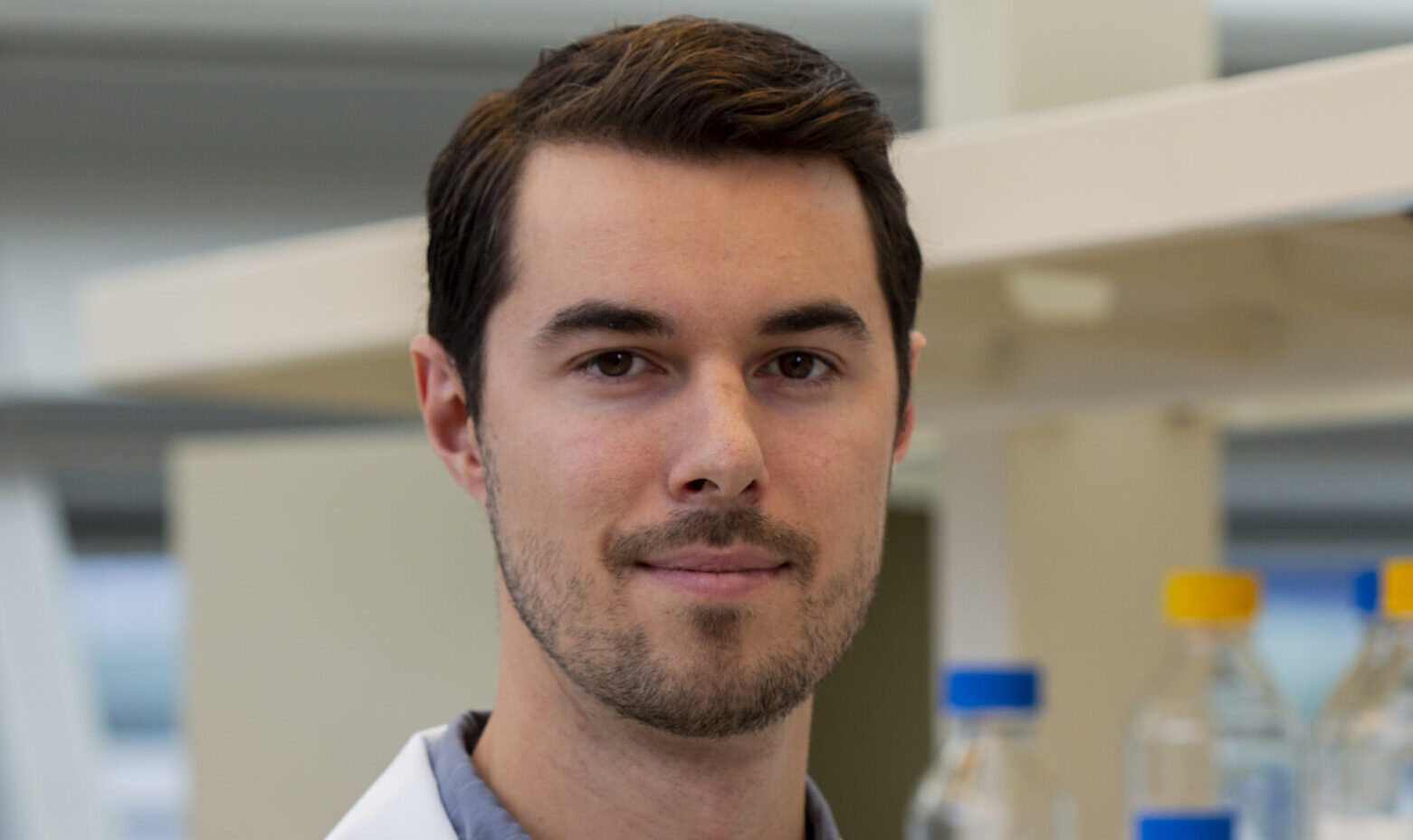Throughout the year, we highlight Van Andel Institute Graduate School’s doctoral students. This month features Jordan Prahl, a student in the lab of Dr. Gerry Coetzee. Jordan studies how genetic factors impact the development of Parkinson’s disease, a progressive neurodegenerative disorder that affects 7–10 million people worldwide.
Q: How would you describe your area of study to someone without a science background?
JP: Most people associate Parkinson’s disease (PD) with old age, but part of the risk is written in our DNA and may begin even before birth. My team and I study a mutation of a single letter in the genetic code that raises one’s risk for PD. Although it is a high-risk mutation, nobody knows quite how it works or what it does. Our research points toward this mutation’s role in neuronal development, which means PD is, in part, a developmental disorder.
Q: What do you want to do with your degree?
JP: In short, I want to solve problems. Grad school has shown me that I really enjoy identifying and answering questions, so I will be looking for any opportunity to keep flexing those creative muscles.
Q: Did you take time off before starting your Ph.D. degree or come directly from an undergraduate or master’s degree program?
JP: After I graduated in 2013, I took a couple years “off” as a bartender. Sometimes it was tedious, and sometimes it was stressful, but I honestly gained a lot from that experience. Most notably, I met my wife, Heather, while I was working at the bar. She’s the one who encouraged me not to give up on science after I struggled to get my foot in the door. Thanks to her, I joined the Institute as a technician in 2015 and eventually joined the Graduate School in 2017.
Q: Do you think there is any value in social networking with other graduate students in non-related fields?
JP: Absolutely. The toughest problems to solve require an interdisciplinary approach, and if you want to be effective at addressing those problems, then you’re going to need friends in a lot of fields. I bounce ideas off friends in other fields constantly. Plus, you never know who’s going to help you make your next career move.
Q: Did your past experiences in life or education help prepare you for graduate school, or did you have to develop different strategies to succeed?
JP: My time in undergrad was a bit rocky, but it definitely helped prepare me for grad school. I let distractions get to me, and I dug myself a hole academically, but it forced me to focus and be responsible.
Q: What is your favorite stress-reduction technique?
JP: When I’m stressed, I like to play with my dog, hang out with friends and family, and visit the breweries around Grand Rapids.
Q: Why did you choose Van Andel Institute Graduate School?
JP: Van Andel Institute was the first community to give me the opportunity to get research experience as an intern, and I feel a certain level of loyalty for that. More importantly, after working at the Institute for several years, I witnessed firsthand the quality of research being conducted here and the respect VAI shows for all its scientists.
Q: If you were asked to put something in a time capsule for each year you have been in the program and this capsule would not be opened for 25 years, what would you contribute?
JP: From my first year, I’d put in my first research proposal to remind me of how much I’ve improved. From my second year, I’d include my lab notes so I could laugh at my first attempts to use CRISPR-Cas9. Third year, I’d include my mask from the pandemic. And from fourth year, I’d include the ultrasound of my sons.
Q: If you hadn’t been admitted to graduate school, what do you think you would be doing right now?
JP: I can say with certainty that I would be doing science no matter what. I wasn’t admitted to grad school the first time around (or second, or third). But rejection made me confront if it was worth the pursuit, and for me it was, so I never gave up.
Most recently, I didn’t get into Van Andel Institute Graduate School, but I told them I’d see them again next recruiting cycle. The following year during my interview I told them we could do it now, or next year, but I wasn’t going to quit until they accepted me. I think that’s the mindset you need in order to be successful in grad school (and science in general).
Interested in Van Andel Institute Graduate School? Learn more at vaigs.vai.org and read previous student spotlights here.
